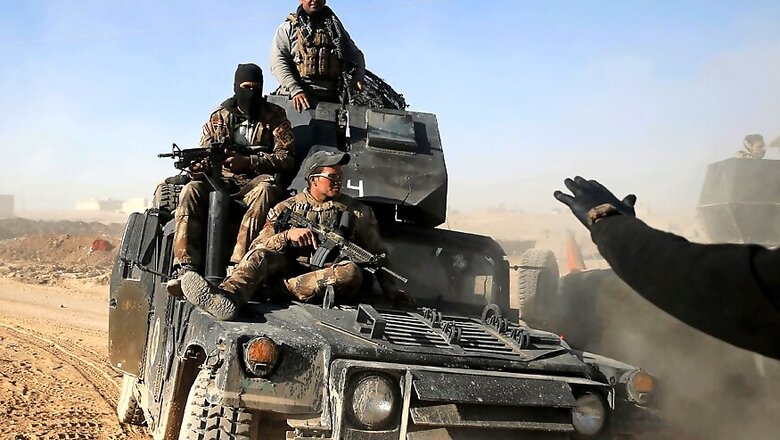
views
Mosul, Iraq: They came by the hundreds — men, women and children fleeing the battle for Mosul, some bloodied and crying out for help. So large was the crowd on the road that Iraqi troops initially ordered them back, worried that an Islamic State suicide bomber could be hiding among them.
Mosul's residents are fleeing in growing numbers as Iraqi forces push deeper into the country's second largest city, and the battle-hardened extremists are fighting for every block, exploiting the dense urban terrain and using civilians as human shields.
On Wednesday the tide of displaced people reached the Samah district, where Iraqi medics treated dozens of wounded, including at least six soldiers.
At one point, four children and a man from the same family were rushed into the station, bleeding heavily as their relatives wailed in grief. A mortar round had slammed into the inner courtyard of their home. A few minutes after being brought to the aid station, a 16-month-old girl with a head wound was pronounced dead.
Then the main rush came — hundreds of civilians racing forward on a dirt road. The troops ordered them to halt, saying they had intelligence that IS might send suicide bombers disguised as civilians. One of the men raised his shirt to show that he wasn't armed, saying he was desperate for food.
Mosul, which fell to IS in the summer of 2014, is still home to more than 1 million people. Fearing a mass exodus, authorities have urged residents to stay inside their homes. But the presence of civilians has prevented the U.S.-backed Iraqi forces from using overwhelming force, slowing their advance and prolonging the city's agony.
The UN says at least 68,000 people have fled the fighting in Mosul, including 8,300 over the past four days.
Later on Wednesday, Iraqi soldiers arrived from the front lines with a man who was bound and hooded. They said they had caught him burning tires to help the militants hide from airstrikes and the drones that buzzed overhead. Trembling, the man said he had been forced to aid the extremists.
Black Humvees carried wounded soldiers back from the front. The body of a special forces soldier killed in combat was wrapped in a blanket on the hood of a vehicle. The Iraqi military does not release official casualty figures, but field medics say dozens of troops have been killed and wounded since the Mosul operation began last month.
Mortar rounds, artillery and gunfire rang out throughout the day, punctuated by occasional booms from airstrikes that sent plumes of smoke into the air.
A pre-dawn airstrike by the US-led coalition struck a bridge across the Tigris River, which divides the city in two, leaving only one crossing intact and disrupting IS supply lines. It was the second bridge to be struck this week, and two other bridges were destroyed by airstrikes last month.
Until now, most of the fighting has been on the eastern bank of the Tigris. Iraqi forces are expected to use pontoon bridges when they reach the river.
A spokesman for one of several state-sanctioned Shiite militias meanwhile said they had seized a road to the northwest of Mosul linking the city to Raqqa, the de facto capital of the IS group's self-styled caliphate. The militias have been converging on Tal Afar, an IS-held town west of Mosul that had a Shiite majority before falling to the extremists in 2014.
"We have cut off Tal Afar from Mosul and we cut off Mosul from Syria," Jaafar al-Husseini, a spokesman for the Hezbollah Brigades, told The Associated Press.
Elsewhere in Iraq, more than a dozen small-scale attacks in and around Baghdad killed at least 31 people and wounded 103, according to police and health officials, who spoke on condition of anonymity because they were not authorized to brief reporters.
IS still regularly targets the capital despite suffering a series of battlefield losses elsewhere in the country over the past year.
















Comments
0 comment